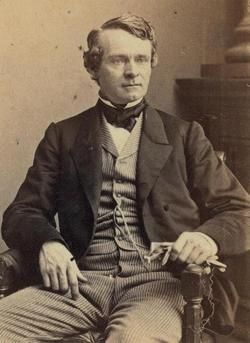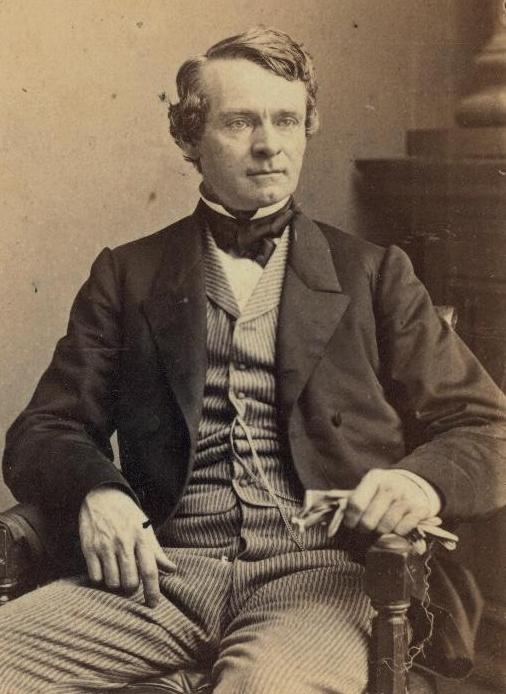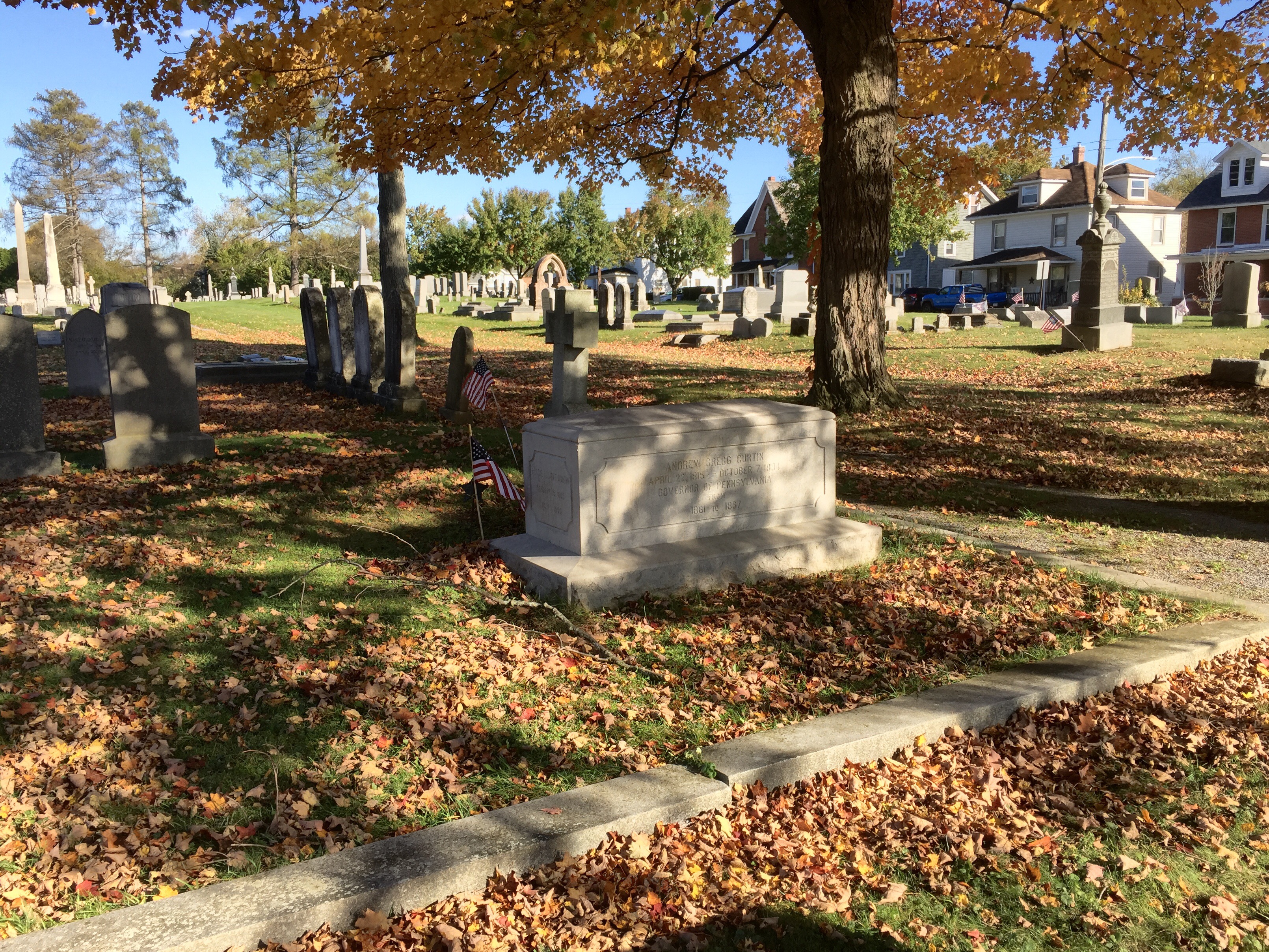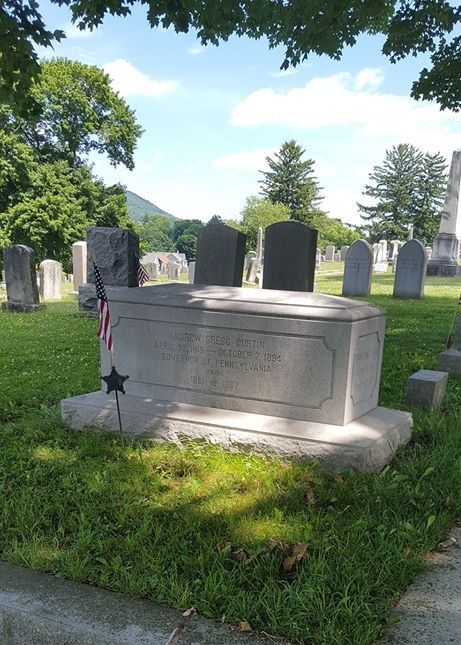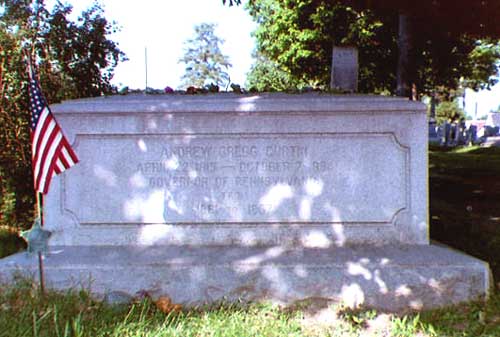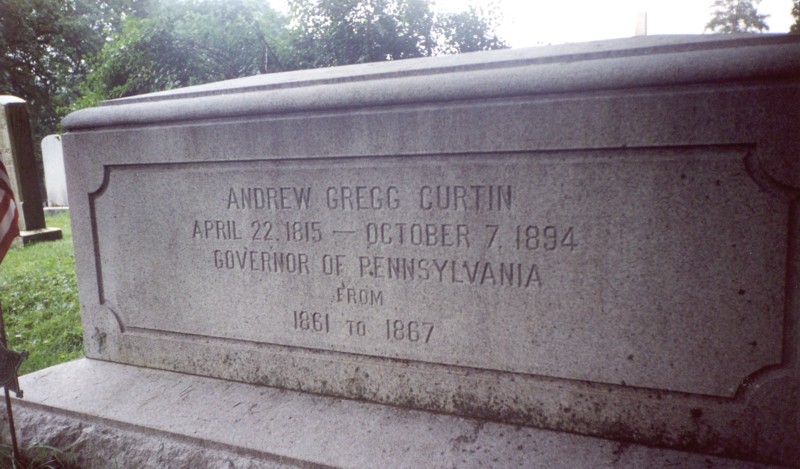Born in Bellefonte, Pennsylvania, he was the grandson of United States Congressman and Senator Andrew Gregg. He received a private education and then began the study of law. He was admitted to the bar in 1839 and, as most lawyers during this time, became interested in politics.
Associating himself with the Whig Party, he used his talents on the campaign stump for Whig candidates, both locally and nationally. He became so well known in the state that, in 1854, he was offered the Whig nomination for Governor, but refused in favor of his close friend, James Pollock. During Pollock's campaign, he served as campaign manager and was named by the new Governor as the Secretary of the Commonwealth of Pennsylvania and later Superintendent of Public Instruction.
He switched his political allegiance to the new Republican Party and was elected Governor in October 1860, becoming the first Republican to hold the office; however, he was listed on the ballot under the People's Party. His platform addressed low tariffs, free homesteads, and the well-being of the laboring man. His odd listing on the ballot and his platform being unrelated to war was due to past poor Republican showings in the state. His inaugural address, denying the legality of secession, at once addressed the war issue and declared him in the Republican camp. He quickly became a national political figure.
Handling a state budget deficit half the size of the Federal government's, he secured an additional $3 million appropriation in 1861 for pay and outfitting of state troops. He personally raised regiments, his state contributing 427,000 enlistments during the war.
In the 1862 political gloom following the Battle of Antietam, he organized the Union Governors' Conference at Altoona, Pennsylvania, where he engineered a declaration of support for the Lincoln Administration, even though many of those who signed placed themselves in political jeopardy. He disliked Lincoln's first Secretary of War, Simon Cameron, only slightly less than he disliked Confederates. Cameron, called the "Czar of Pennsylvania," was the state Republican boss. He refused recognition of the "Czar's" system and power, and their feud, begun in the 1850s, lasted Cameron's lifetime, costing him important appointments and support. Like other Northern governors, he organized relief for soldiers' families, suppressed dissent, and urged industry in war production.
Temporarily in poor health and declining reelection in 1864, he was nevertheless drafted that year for a second run by the Republicans, who successfully touted him as "the soldier's friend." In both terms, he was also a friend to business, repealing an unpopular railroad tonnage tax and permitting industrialists to hire private police forces for suppression of labor organizations. These "Coal and Iron Police" were used to put down dissenters during the coal field draft riots late in the war. He tried to minimize his involvement to prevent harming the Republicans' image with the working man. He was considered in his time, and is known by historians today, as the greatest of the Northern war governors.
In the postwar years, he lost United State Senate, Vice Presidential, and Presidential nominations because of Cameron's influence. He did serve briefly as United States Minister to Russia, being appointed by President Ulysses S. Grant. Having switched to the Democratic Party, he tried, but failed in his first bid to win a seat in Congress. In 1880, he was successful and served three terms. He retired in 1887, later dying in his home town.
He is remembered by four identical statues: one in Bellefonte, one on the Pennsylvania State Monument at Gettysburg, one in the rotunda of the Pennsylvania State Capitol Building, and one at the site of Camp Curtin, a military training camp during the Civil War.
He was the uncle of Union brevet Brigadier General John I. Curtin, and the first cousin of Union Brigadier General David McMurtrie Gregg. His maternal grandfather, Andrew Gregg, served as a Congressman from 1791-1807 and as the United States Senator from Pennsylvania from 1807-1813.
Born in Bellefonte, Pennsylvania, he was the grandson of United States Congressman and Senator Andrew Gregg. He received a private education and then began the study of law. He was admitted to the bar in 1839 and, as most lawyers during this time, became interested in politics.
Associating himself with the Whig Party, he used his talents on the campaign stump for Whig candidates, both locally and nationally. He became so well known in the state that, in 1854, he was offered the Whig nomination for Governor, but refused in favor of his close friend, James Pollock. During Pollock's campaign, he served as campaign manager and was named by the new Governor as the Secretary of the Commonwealth of Pennsylvania and later Superintendent of Public Instruction.
He switched his political allegiance to the new Republican Party and was elected Governor in October 1860, becoming the first Republican to hold the office; however, he was listed on the ballot under the People's Party. His platform addressed low tariffs, free homesteads, and the well-being of the laboring man. His odd listing on the ballot and his platform being unrelated to war was due to past poor Republican showings in the state. His inaugural address, denying the legality of secession, at once addressed the war issue and declared him in the Republican camp. He quickly became a national political figure.
Handling a state budget deficit half the size of the Federal government's, he secured an additional $3 million appropriation in 1861 for pay and outfitting of state troops. He personally raised regiments, his state contributing 427,000 enlistments during the war.
In the 1862 political gloom following the Battle of Antietam, he organized the Union Governors' Conference at Altoona, Pennsylvania, where he engineered a declaration of support for the Lincoln Administration, even though many of those who signed placed themselves in political jeopardy. He disliked Lincoln's first Secretary of War, Simon Cameron, only slightly less than he disliked Confederates. Cameron, called the "Czar of Pennsylvania," was the state Republican boss. He refused recognition of the "Czar's" system and power, and their feud, begun in the 1850s, lasted Cameron's lifetime, costing him important appointments and support. Like other Northern governors, he organized relief for soldiers' families, suppressed dissent, and urged industry in war production.
Temporarily in poor health and declining reelection in 1864, he was nevertheless drafted that year for a second run by the Republicans, who successfully touted him as "the soldier's friend." In both terms, he was also a friend to business, repealing an unpopular railroad tonnage tax and permitting industrialists to hire private police forces for suppression of labor organizations. These "Coal and Iron Police" were used to put down dissenters during the coal field draft riots late in the war. He tried to minimize his involvement to prevent harming the Republicans' image with the working man. He was considered in his time, and is known by historians today, as the greatest of the Northern war governors.
In the postwar years, he lost United State Senate, Vice Presidential, and Presidential nominations because of Cameron's influence. He did serve briefly as United States Minister to Russia, being appointed by President Ulysses S. Grant. Having switched to the Democratic Party, he tried, but failed in his first bid to win a seat in Congress. In 1880, he was successful and served three terms. He retired in 1887, later dying in his home town.
He is remembered by four identical statues: one in Bellefonte, one on the Pennsylvania State Monument at Gettysburg, one in the rotunda of the Pennsylvania State Capitol Building, and one at the site of Camp Curtin, a military training camp during the Civil War.
He was the uncle of Union brevet Brigadier General John I. Curtin, and the first cousin of Union Brigadier General David McMurtrie Gregg. His maternal grandfather, Andrew Gregg, served as a Congressman from 1791-1807 and as the United States Senator from Pennsylvania from 1807-1813.
Bio by: Ugaalltheway
Inscription
GOVERNOR OF PENNSYLVANIA
FROM
1861 TO 1867
Family Members
Advertisement
See more Curtin memorials in:
Explore more
Sponsored by Ancestry
Advertisement
